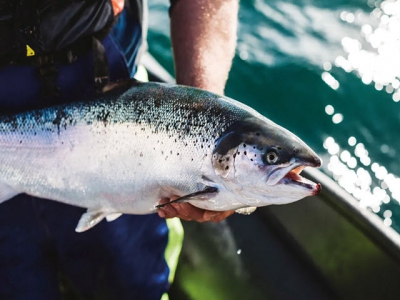Time to compare: which diet leads to lower feed costs in farmed salmon?

A new study has compared the feed cost differences between high-fat and high-protein diets used in salmon farming and finds that high-protein diets could improve feed conversion and growth performance – saving producers money in the long-term.
High-protein diets could improve feed conversion and growth performance in farmed salmon. Photo © Scottish Sea Farms
A recent study in Aquaculture by researchers from the Norwegian University of Life Sciences and the University of Florida has suggested that despite high upfront costs, high-protein diets could improve growth performance and carcass weight in farmed salmon.
The study aimed to compare two energy-dense diets that are commonly used in Atlantic salmon aquaculture. The first diet emulated the industry-preference for feed with a high-fat and low-protein ratio. The second one was more protein-dense and had a lower fat content – often leading to higher prices when compared to the industry standard.
The researchers conducted three comparative feed trials with year-old smolt from 2009-2016. They decided to measure the salmon by carcass weight as opposed to full body weight. The decision to measure carcass weight gave them a better overview of both the biological and economic performance of the diets.
Results indicated that the high-protein diet led to higher feed deposition in the carcass (feed was converted to meat instead of being used in regular metabolic function). Since the high-protein diet led to better feed conversion rates, using this type of diet will translate into lower feed costs for producers. In addition to this benefit, the high-protein diet induced faster growth in the smolt. This could translate into a quicker production cycle – an additional economic benefit.
The model suggested that though the high-fat diets preferred by industrial salmon farmers may be cheaper during initial stages of production, high-fat diets are not necessarily linked to lower feed costs overall.
Có thể bạn quan tâm
 Virus linked to mass tilapia mortalities on Lake Volta
Virus linked to mass tilapia mortalities on Lake Volta A new suspect has emerged in the search for the causes of the massive disease outbreak that has been affecting tilapia on Lake Volta in Ghana.
 Why biosecurity is the best defence against tilapia lake virus
Why biosecurity is the best defence against tilapia lake virus The first confirmed case of tilapia lake virus (TiLV) in the USA emphasises the need for producers to ensure biosecurity is a top priority
 Arbiom: Trials support wood to feed protein’s candidature as fishmeal substitute
Arbiom: Trials support wood to feed protein’s candidature as fishmeal substitute Biotechnology company, Arbiom, has provided additional details on results from fish feed and functionality trials of its wood-to-food protein ingredient